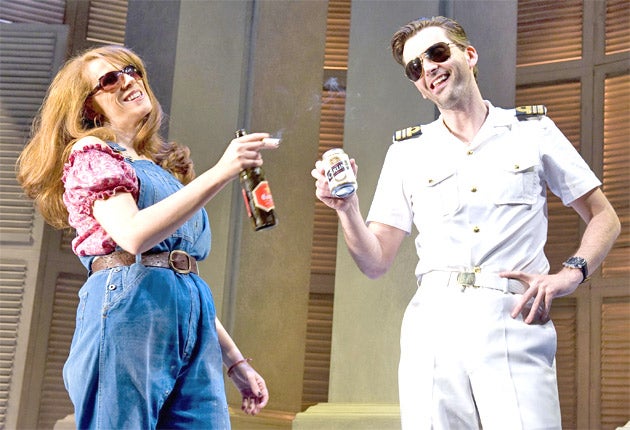First Night: Much Ado About Nothing, Wyndhams Theatre, London
Despite Tennant's gloriously engaging Benedick - I'd rather go to the Globe

It would be hard to conceive of a more gloriously engaging portrayal of Benedick than the one David Tennant is now offering in Josie Rourke's production of Much Ado About Nothing, a staging that transforms Shakespeare's demobbed soldiers into white uniformed naval officers on shore leave in Gibraltar during the 1980s. Revelling in the hilariously sarky, sceptical music afforded by his native Scots tones, Tennant seems to subsume the functions of stand-up and top-flight classical actor.
First seen like a loon at the wheel of a Union Jack-festooned golf buggy, he plays this ostensibly determined bachelor as the Navy's resident, loveably cantankerous crank, his eyebrows forever jumping to 45-degree angles of scorn at the thought of marriage. Yet there is such life and gusto in the figure that the exhilarating energy alone tends to belie his anti-romantic stance.
I regret to report, though, that, in most other respects, this indoor, proscenium-arch account of the play fails to match – in confidence, sprezzatura, warmth of wit, or understanding of the heart – the version that opened last week at Shakespeare's Globe. A rare mis-step for the admirable Josie Rourke, this production feels effortful and inauthentic.
Shakespeare's play depends upon Beatrice and Benedick being original, independent spirits whose drawbacks are exemplified when the clean-cut, limited Claudio (here strikingly played by Tom Bateman) brutally rejects Hero (Sarah MacRae) at the altar because of a false rumour. But the 1980s setting – which draws on Gibraltar's reputation for being a Club 18-30 garrison of cheap booze and trashy hedonism – distorts these distinctions to the point of incoherence.
That stiff-necked, misogynistic show-down at the aborted nuptials looks like a sudden throw-back in a world where we've seen Hero have a raunchy hen-night (replete with sailor stripogram) and where all ranks descended for a pre-wedding party on an orgiastic disco where you'd be a misfit in not making out with someone.
Beatrice is portrayed by Tennant's old comrade in the Tardis, Catherine Tate. The update allows her to play Beatrice's spirited, cynical raillery as the shrugging truculence of a rather yobby ladette. This Beatrice, sporting dungarees, puts a distance between herself and her true emotions by adopting "funny" voices and retreats behind a squawking headless chicken routine of excitement when called on to react honestly to a declaration of love.
To gauge the difference of skill between herself and her co-star, you only have to look at the gulling scenes which take place while the main room in the garrison is being decorated. Overhearing home truths about himself, Tennant's Benedick accidentally drops his hand in a tray of white paint, his preoccupation deliciously signalled by the way he continues to rake his hair with it and meditatively rub his face regardless. Tate dangling in the air in a decorator's harness takes one no further into the character.
But, with regard to this heroine's psychological background, the production is either thin or crazy. It's important that Beatrice and Hero live in a household with no older female authority figure. Rourke invents a mother for Hero and equips the character with the scant lines assigned to the uncle in the play. All this cipher can do is look pained and ineffective. It's typical of a production that is over-interpreted and insufficiently thought-through.
Join our commenting forum
Join thought-provoking conversations, follow other Independent readers and see their replies
Comments
Bookmark popover
Removed from bookmarks